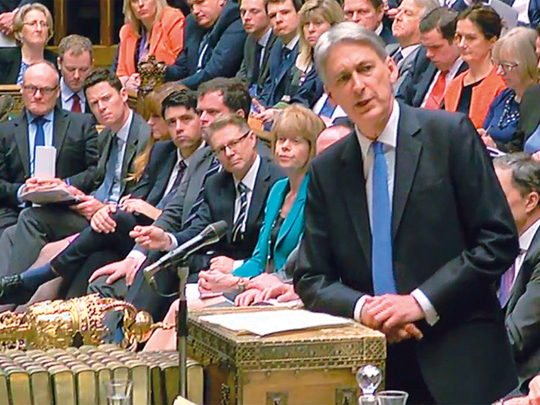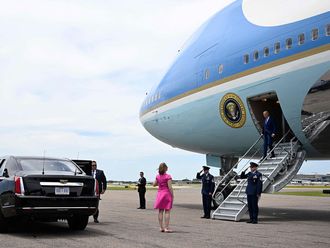
London
Prime Minister Theresa May’s under-fire government acknowledged the UK economic outlook is deteriorating and unexpectedly set aside an extra £3 billion ($4 billion) to prepare for all Brexit outcomes.
Opening his Budget speech in Parliament on Wednesday, Chancellor of the Exchequer Philip Hammond said the Office for Budget Responsibility now sees 2018 economic growth of 1.4 per cent compared with the 1.6 per cent predicted in March as a result of revised productivity data and headwinds caused by Britain’s vote to quit the European Union. Growth is predicted to be lower than forecast in every year through 2021.
The announcement of Brexit funding shows he’s relented to demands from more pro-Brexit factions of the cabinet to set aside money so the UK can walk away from divorce talks with the European Union. It’s also noteworthy that back in March 2016 — before the referendum — the OBR predicted much healthier growth of 2.2 per cent in 2017 and 2.1 per cent in 2018.
May’s government has been rocked by resignations, rebellions and sluggish progress in Brexit negotiations, and Hammond sought to strike an optimistic tone while limiting spending to fit the new economic reality.
“While we work to achieve this deep and special partnership, we are determined to ensure that the country is prepared for every possible outcome,” Hammond said.
“We have already invested almost £700 million in Brexit preparations and today I am setting aside over the next two years another £3 billion and I stand ready to allocate further sums if and when needed.”
The timing of the Budget coincides with a particularly delicate time in Brexit negotiations — meaning there is even less space for mishaps. May is getting ready to make a better offer on what the UK will pay in order to leave the bloc with both sides engaged in high-stakes diplomacy to try to get a breakthrough at a crunch December summit in Brussels.
Even though Hammond’s ability to offer populist giveaways to win back support lost in June’s catastrophic election is limited, he said there will be an extra £3.75 billion for the National Health Service next year and that he would fund any agreement by Health Secretary Jeremy Hunt to increase nurses’ pay.
What Our Economists Say ...
Hammond also froze tax on fuel and alcohol and said money would be available to smooth access to benefits under the Universal Credit program in response to complaints from lawmakers on all sides that the poor were having to wait too long to get help.
Thresholds for paying income tax will be raised to £11,850 for the basic rate of 20 per cent and £46,350 for the 40 per cent higher rate, Hammond said.
Addressing Britain’s housing crisis, Hammond said £44 billion will be earmarked for housing over the next five years with support for programmes to build affordable homes and force through the construction of housing on disused land. Local authorities will also be given the power to double taxes on properties left empty.
Hammond also announced the abolition of stamp duty, a tax on home purchases, for first- time buyers on all properties up to £300,000. In London, where property is more expensive, it will apply to the first £300,000 of any first home purchase.
The fate of May’s government is tied both to a Budget that isn’t a dud and to making progress in Brexit talks so the focus can shift to trade and securing a smooth transition out of the bloc for businesses concerned about a chaotic departure.
Budget deficit
The budget deficit will be £39.5 billion for 2018-19, Hammond said, compared with the £40.8 billion forecast in March, and borrowing will be less than previously forecast over the next five years.
In the debate that follows Hammond’s statement, he will be listening for support from his own lawmakers. He can assume the opposition will attack, but with such a slim majority he can’t afford to lose the support of his own side.
There is the possibility that some Tories, itching for a fight, will pounce on any error as a sign of his unsuitability for the job. He’s particularly vulnerable to criticism from euroskeptic Tories who see him as too gloomy about Brexit and partisan in his views.
The chancellor, who voted to remain in the EU in last year’s referendum, has angered pro-Brexit lawmakers by advocating a gradualist approach to leaving the EU and warning of the danger to the economy of a hard break from the bloc. Others have criticised his caution over spending as Labour’s anti-austerity agenda has won support from voters.












